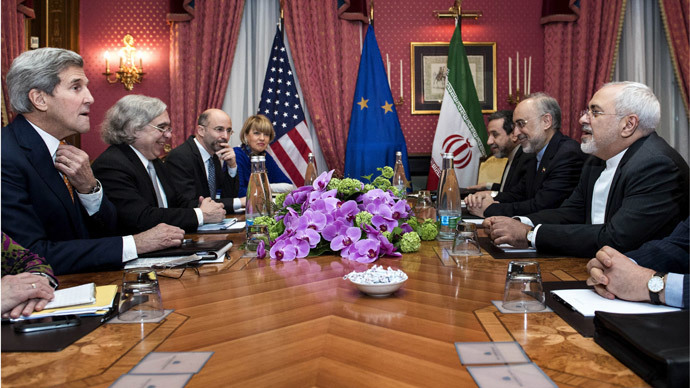‘Israel is elephant in the room in Iran-US relations’

Israel is a key obstacle to the US-Iran thaw since the growing regional economic influence of Tehran presents a number of geopolitical and strategic stumbling blocks for Israel and its hegemony in the Middle East, political analyst Eric Draitser told RT.
RT:Both the US and Iran were pretty up-beat after the framework nuclear deal but their relations seem to have chilled since then. Iran's Supreme Leader has accused the US of demonizing Tehran, adding that the real threat to the world is America itself. Washington in turn is sending warships to the shores of Yemen allegedly to intercept Iranian arms shipments. What do you make of it?
Eric Draitser: I think there are a number of factors that go into that. On the one hand, there is a domestic political conflict in the US. Anybody who has been following the news can see quite clearly the split between the Obama administration and many elements in the US government, be they on Capitol Hill in terms of Republican and Democrat hard-liners vis-à-vis Israel and Iran. We also see a split between the White House and certain elements in the Pentagon. So there are a number of key domestic political issues that are driving this. But there is also the large strategic and geopolitical conflict that has been initiated by Saudi Arabia, a key US ally. So the US is really in a position where it has to posture quite aggressively, quite belligerently against Iran in order to justify what I think is quite clearly an illegal aggression that has been committed by Saudi Arabia. And I think it’s interesting that if you examine the story that came across from the Associated Press regarding the US sending naval vessels into the region. They are extensively doing so in order to prevent Iran from bringing in weapon shipments to the Houthi rebels in Yemen in violation of a UN Security Council resolution. Of course what is left out of that narrative is the fact that Saudi Arabia and its coalition also have no UN Security Council authorization to wage this war in the first place. It’s not only demonization of Iran but it’s the US attempting to justify and to legitimize what I think is quite clearly an unjustifiable aggression by it and its allies.
READ MORE: Khamenei accuses US of creating Iran nuclear weapons ‘myth’
RT:Do you think the initial nuclear deal agreed to a month ago gives a solid base for an all-encompassing future deal and if so why?
ED: It’s possible because there are certainly mutual beneficial aspects to this deal. Of course, Iran is looking for normalization of economic relations not simply with the US but with many key Western countries. Also, the US or rather the Obama administration was looking as this being one of the key touch stones of the Obama legacy. So there were definitely key motivators for a framework to a deal but as I already mentioned there are elements that have been looking to sabotage that deal. And I think what we are beginning to see is the real power behind the scenes in Washington that is quite successfully torpedoing any chance to have s substantive deal. Now of course the question has always been to what extent is the US really going to be able to live up to the terms of this deal particularly with the understanding that the Obama administration will be coming to an end next year. And depending on whichever party wins the elections of 2016, be it Hillary Clinton and the Democrats or whoever the Republicans are going to put up, that they will quite likely take a far more aggressive and belligerent stance vis-à-vis Iran. And so there was definitely a small narrow window of opportunity and the events in Yemen, these developments quite recently, have closed that window significantly. Now whether it’s entirely closed at this point I think remains to be seen but certainly there are calls for skepticism.
RT:Is Iran's nuclear program the only significant stumbling block to improving relations between Iran and the US?
ED: No, of course not. The nuclear program - while it’s an important element – is in many ways a pretext for a far larger stumbling block, a far larger obstacle to normalizing relations with Iran and that is of course the elephant in the room – Israel. Israel has maintained an incredibly aggressive policy towards Iran and Israel wields a tremendous amount of influence in Washington. And it’s the Israel lobby be it the American Israel Public Affairs Committee (AIPAC) or many of the other pro-Israel groups that have tremendous sway in Washington. They are the ones who to a large extent are really presenting a major obstacle towards a thaw in the US-Iranian relations. And there are a number of reasons why: Israel is concerned about Iran’s growing economic influence in the region, Israel sees Iran as its principle rival for hegemony in the Middle East, and Israel sees in Iran a potential partner for Russia, China, India, Pakistan and Afghanistan as well in the coming years. So Iran presents a number of geopolitical and strategic stumbling blocks for Israel and for Israeli hegemony and that’s much of the reason why Israel maintains its posture in Washington.
MORE:
The statements, views and opinions expressed in this column are solely those of the author and do not necessarily represent those of RT.
The statements, views and opinions expressed in this column are solely those of the author and do not necessarily represent those of RT.













